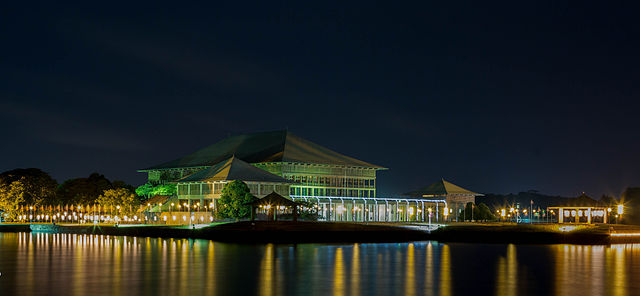
SL Turmoil: Ranil Gains Control Of Key Parliamentary Panel
Ranil camp plans to submit another no-confidence motion to parliament before December 4, when the Supreme Court starts hearing petitions against Sirisena’s bid to dissolve Parliament.
Factions around Rajapaksa and ousted Prime Minister Ranil Wickremesinghe battled for control of the Parliament Select Committee (PSC) on 23 Nov This committee determines Parliament’s functions, including its agenda. Ranil had the way in the end. And the political crisis continues to grip Sri Lanka.
Last Sunday, at an “all party conference,” President Maithripala Sirisena told the opposition led by Ranil Wickremesinghe’s United National Party (UNP) he did not accept the no-confidence motions passed against Rajapaksa, his appointee, because they did not follow parliamentary standing orders.
At the beginning of yesterday’s parliamentary session, Speaker Karu Jayasuriya said that as party leaders could not agree on the PSC’s composition, he had nominated members according to “the provisions secured by the constitution.”
Jayasuriya allocated five seats each to Rajapaksa’s faction and the UNP, and one each for Janatha Vimukthi Peramuna (JVP) and Tamil National Alliance (TNA). As the JVP and TNA back the UNP, the opposition now controls the committee, as well as the Speaker’s post. Jayasuriya is a senior member of the UNP.
House Leader Dinesh Gunawardena, a Rajapakse supporter, declared that his faction would walk out to “oppose the unconstitutional composition” of the PSC. He accused Jayasuriya of acting partially.
After the government members left the chamber, the remaining 121 MPs voted on the committee nominations electronically, according to a proposal by JVP MP Vijitha Herath. The JVP is effectively backing the UNP to regain office.
UNP leaders jubilantly claimed the vote also showed that the majority of the parliament opposed the Rajapakse-led government, which they claim Sirisena illegally appointed.
The opposition MPs continued the parliamentary session until the evening to propagate their criticisms of Sirisena for installing Rajapaksa to replace Wickremesinghe as prime minister. After their speeches, parliament was adjourned until next Tuesday.
On November 12, Sri Lanka Apex Court suspended Sirisena’s proclamation dissolving parliament pending a further hearing.
Gunawardena told the media that Rajapaksa group would boycott Parliament. “We would decide later whether to participate after considering its next agenda”.
By controlling the PSC, the UNP-led opposition seeks to cripple the Rajapakse administration. Supported by the JVP and TNA, it has submitted a motion to suspend funds to the office of prime minister, which could be passed on November 29.
Reports in the media say that the Ranil camp plans to submit another no-confidence motion to parliament before December 4, when the Supreme Court starts hearing petitions against Sirisena’s bid to dissolve Parliament. On November 12, the court suspended Sirisena’s proclamation dissolving parliament pending a further hearing.
At a meeting in the southern town of Beliatta on Thursday, Rajapakse reiterated his call for an election. “All people in this country are saying that the best way to solve the crisis is to go before the people,” he said, promising concessions, including for farmers and small holders. This is no more than cynical posturing.
Rajapakse has clamoured for a parliamentary election since his Sri Lanka Podujana Peramuna (SLPP) won a majority of councils in February’s local government polls. Calculating that the SLPP could exploit the popular opposition to the Sirisena-Wickremesinghe government, he promised to establish a “strong government” and salvage country from an “anarchic situation.”
Rajapakse has clamoured for a parliamentary election since his Sri Lanka Podujana Peramuna (SLPP) won a majority of councils in February’s local government polls.
This week, the Moody’s rating agency downgraded Sri Lanka and the IMF said it would delay its next loan programme discussions “pending clarity on the political situation.” Reuters reported that during the past four weeks alone, 17.2 billion rupees flowed out of the bond market, along with 7.8 billion rupees from the stock market. By yesterday, the Sri Lanka Rupee has registered nearly a 15 per cent depreciation since the start of the year. It dropped for less than 180 per dollar.
On Tuesday, Colombo-based diplomats from the US, UK, Canada, Norway, Switzerland, EU, India, Korea and Bangladesh met with TNA parliamentarians, led by its leader R. Sambandan.
After the meeting, Sambandan told the media: “Action should be taken immediately to resolve the crisis.” He added: “The diplomats have said we will do what we can do.”
-
CHINA DIGEST
-
 ChinaChina Digest
China’s PMI falls for 3rd month highlighting challenges world’s second biggest economy faces
ChinaChina Digest
China’s PMI falls for 3rd month highlighting challenges world’s second biggest economy faces
-
 ChinaChina Digest
Xi urges Chinese envoys to create ‘diplomatic iron army’
ChinaChina Digest
Xi urges Chinese envoys to create ‘diplomatic iron army’
-
 ChinaChina Digest
What China’s new defense minister tells us about Xi’s military purge
ChinaChina Digest
What China’s new defense minister tells us about Xi’s military purge
-
 ChinaChina Digest
China removes nine PLA generals from top legislature in sign of wider purge
ChinaChina Digest
China removes nine PLA generals from top legislature in sign of wider purge
-
-
SOUTH ASIAN DIGEST
-
 South Asian Digest
Kataragama Kapuwa’s arrest sparks debate of divine offerings in Sri Lanka
South Asian Digest
Kataragama Kapuwa’s arrest sparks debate of divine offerings in Sri Lanka
-
 South Asian Digest
Nepal: Prime Minister Dahal reassures chief ministers on police adjustment, civil service law
South Asian Digest
Nepal: Prime Minister Dahal reassures chief ministers on police adjustment, civil service law
-
 South Asian Digest
Akhund’s visit to Islamabad may ease tensions on TTP issue
South Asian Digest
Akhund’s visit to Islamabad may ease tensions on TTP issue
-
 South Asian Digest
Pakistan: PTI top tier jolted by rejections ahead of polls
South Asian Digest
Pakistan: PTI top tier jolted by rejections ahead of polls
-






Comments